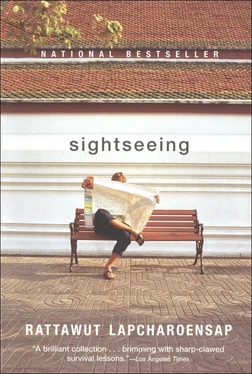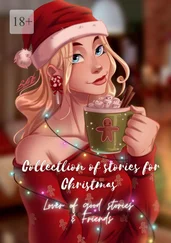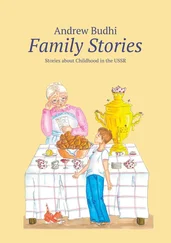“Don’t start, Ladda.”
“It’s true. I even looked it up at the library to make sure Papa wasn’t lying.”
“Even if that was true,” Mama said, putting down the bra she was working on, “don’t forget that Mister Cockfighting King got killed riding an elephant into battle.” She tapped her head with a finger.
I got up to stretch my limbs; I didn’t want to talk about it anymore.
“I don’t want your father going back to that cockpit,” Mama said. “Not after what they did to him. He acts like he hasn’t been living here all his life. Talk to your father, will you? Maybe he’ll listen to you.”
I nodded, sat back down.
“He doesn’t know what he’s getting into,” Mama continued. I nodded again, tried to concentrate on the work at hand.
“Try this,” Mama said suddenly, throwing a finished bra in my direction, a red and black contraption studded with dozens of fake pearls. “I think it’s your size.”
“I don’t think so,” I said, catching the bra, tossing it back onto the mound between us. “It’s hideous, Mama.”
“C’mon. It won’t bite,” Mama said. “It’s ugly, I know. But it’s underwear. Nobody’ll see it. You’re fifteen now. Time to stop showing strangers your nipples.”
“But you didn’t wear a bra until you were thirty, Mama.”
“I know,” Mama said. “But we didn’t have them then. Those were barbarous times, you know. We lived like monkeys. We didn’t have television. We didn’t have cars. We danced naked around bonfires at night. We wore diapers to catch our menses. You should be thankful for the times, Ladda. Be thankful for this bra. You should be thankful for the modern age.”
V
I tried to speak to Papa that Saturday. He was out in the chicken house sharpening his spurs, the whetstone singing a high, insistent note like an asthmatic wheezing in the night. Fireflies winked in the rubber trees. “Hey,” he said when I opened the chicken-house door.
I settled onto a bale of straw as Papa sprinkled water from a bowl over the whetstone with his fingers. The whetstone shimmered under the light of the oil lantern at his side. The spurs lay at his feet in a neat, military row, arranged from shortest to longest like toy scythes laid out for some miniature farm auction. All the cocks slept peacefully in their coops, crowns tucked into their pillowy breasts. Papa laid the whetstone down and bent toward the lantern to light a cigarette.
“I know your mother doesn’t want me going to the cockpit tomorrow,” he said, exhaling ribbons of smoke through his teeth, picking up the whetstone again. The scent of burnt cloves filled the chicken-house air. As Papa spoke, I realized I hadn’t seen my father’s bruises up close. They looked like splotchy indigo maps.
“She just doesn’t want you to get hurt.”
“I know,” he said. “What do you think I should do, Ladda?”
“Don’t go,” I said curtly. I was surprised by the directness of my response. My face suddenly swelled with emotion, peering at the bruises on my father’s face. “It’s not worth it, Papa.”
He looked at me. Then he went back to sharpening a spur, the blade glinting as he wiped it back and forth across the whetstone plane. We sat silently for a while. I watched our shadows dance on the mud walls. Outside, the strays started in on their howling.
“Well,” Papa said, sliding the spurs into their vellum sheaths. “You might be right, Ladda. It might not be worth it.” He put out the cigarette on the soles of his slippers, stowed the spurs into the case Mama had sewed for him years ago. “But,” he continued, “living in fear wouldn’t be worth it either.”
“Papa—”
“It’s a scary world, Ladda,” Papa said, smiling at me, clicking the case shut. “This isn’t a matter of honor, Ladda. It isn’t even about standing up to Little Jui and his kind. It’s about choosing whether you’re going to let the world run you ragged and scared or whether you’re going to say to the world: ‘Hey, World. Hey, asshole. Yeah, you. That’s right, I’m talking to you. I know you’re scary but you know what, World? I refuse to run. I refuse to let you push me around. I, Wichian, am staying right where I am.’”
I couldn’t help but laugh then, imagining Papa confronting a giant cartoon globe with stubby little legs. My father joined in. We sat there laughing in that chicken house for a bit. I got up, brushed the straw from the seat of my pants. “Hey,” he said. “When did you start wearing a bra?”
“What’s with you people?” I said exasperatedly, walking toward the door. “Leave me alone.”
VI
So Papa went back to the pit. That Sunday afternoon, while he was away, Mama and I sat on the porch sewing the last of the month’s quota, packing the bras into cardboard shipping boxes. Miss Mayuree, the company’s representative, was coming to pick up the bras the next day. We worked silently, furiously, the sun arcing slowly across the sky. Mama didn’t say much. She was worried about Papa. She jolted a little every time a car engine could be heard rumbling down the road. I tried to make small talk. I told her stories about high school: the drunken math teacher, the schoolyard courtships, the latest rumors and intrigues. I even ventured a few jokes about the leather-tasseled novelty models we’d made, but Mama smiled at me as if to say, Thanks for the effort, little daughter, but let’s just finish these bras. Let’s hope your father makes it home tonight.
The sun began to set. Mama was worried now. She furrowed her brow. She shook her legs involuntarily. She went into the house and came out with Papa’s flask of Mekong. Mama drank when she was nervous. She poured a generous dram into the tumbler. She took a few sips and settled onto the porch floor beside me, stuffing bras into plastic bags while I sorted the models and put them in their appropriate boxes. She offered me the tumbler and I, too, took a few sips even though I hated the way the fiery liquid burned.
“I can’t stand this,” Mama said, swirling the whiskey in its tumbler, looking down the road again.
“Soon, Mama,” I said, the whiskey hot and heavy in my stomach. “Don’t worry. He’s probably having a good day. He’s probably winning.”
“I don’t care about that,” Mama said. I didn’t know what to say, so I just kept on stacking the bras into their boxes.
“I’ll tell you a story,” Mama said suddenly, filling the tumbler once more. “Listen up,” she said. “Your father had a sister once.”
I stopped working, looked at my mother.
“You didn’t know that, did you?” She raised her eyebrows conspiratorially. “Well, I suppose there’d be no reason for you to know. Nobody likes to talk about it anymore, not even the ninnies in town.
“This sister,” Mama continued. “She was a little slow, if you know what I mean. She was older than your father, too — about thirty, by the time I met her. Your father would come home from the high school and take her into town every afternoon. He’d buy her a bag of iced tea and they’d sit together on one of the park benches playing imaginary games. They’d laugh and guffaw like children. When I first met your father, I thought it was cute how he took care of his sister, even though the other boys made fun of him, kept calling her a tard to his face. But your father paid them no mind. She was his sister. There was nobody else to care for her, with your grandparents being the lunatics they were.
“Your father was different in those days,” Mama said, staring blankly into the tumbler. “He wanted to be a pilot — did you know that? He wanted to fly planes. I’d sit with him in the schoolyard during lunch and he wouldn’t shut up about jets and flight controls and horsepower. Your father was going to be the Thai Charles Lindbergh. That’s what he liked to say. We were going to move to Bangkok. He was going to fly me across the Pacific.” Mama chuckled at the idea, swallowed another sip of whiskey. “So when your father went to officer school in Bangkok, there was nobody to take care of his sister.”
Читать дальше











